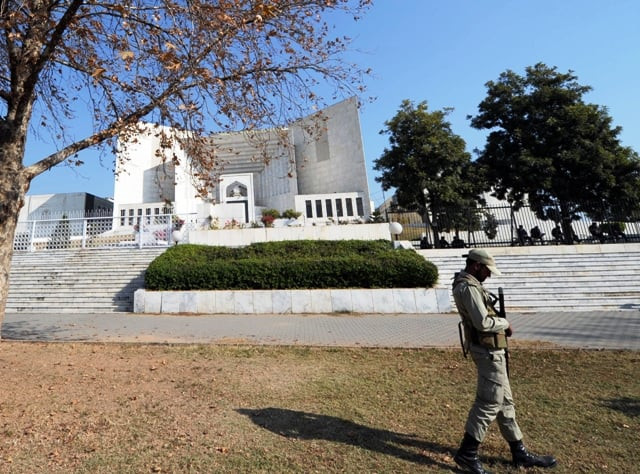SC accepts petition against Army Act
Court issues notice to defence authorities, attorney general.

The court also issued notices to defence authorities and the attorney general of Pakistan to appear before the court and adjourned the case till the last week of August.
A three-member bench headed by Chief Justice Iftikhar Muhammad Chaudhry heard the petition filed by Colonel (retd) Muhammad Akram, who served in the army for over 30 years in army’s Judge Advocate General (JAG) Branch. He termed clauses of the Army Act which are against the Constitution and submitted that such discriminatory clauses should be amended.
The petitioner stated that it is discriminatory and against the Constitution if the verdicts by military courts are not immediately announced to the accused which makes him unable to file any application. Col Akram also said that a civil court is bound to give reasons to a murderer when awarding him a sentence as per the Constitution, but the army courts only relied on words “the charge has been proved” which was unfair and unconstitutional.
Deputy Assistant Advocate General of JAG branch Major Shahjahan also appeared before the court and said that the Army Act does allow for a fair trial of the accused person.
The chief justice asked if findings are not announced before confirmation then how one can file an appeal and get the opportunity of a fair trial.
In his application, petitioner Akram maintained that to take a statement from an accused on oath during a court martial and then use it against him as evidence is contradictory to the Qanoon-e-Shahadat and that the Constitution does not allow compelling an accused to give statements on oath.
“Section 31 of the Army Act allows an accused to submit a petition against the findings or decision of a military court,” Akram maintained, adding that “the finding(s) and sentence of all military courts except the summaries are required to be confirmed”.
Justice Jawwad S Khawaja said that defence authorities should also consider Article 10A of the Constitution that gives due process right to every person. The court also asked Major Shahjahan why the Article 10A of the Constitution that was introduced through the passage of 18th Amendment during martial law trials was not considered.
The court also said that the army authorities should consider the recording of reasons and decide the giving findings on the charge, and the judgment should have certain grounds.
Col Akram said that the criminal jurisprudence tendered prevailing in Pakistan does not allow that the statement of the accused person should be recorded on oath and also of the witness during investigation whether he is from the prosecution or defence, adding that the army authorities were wrongly interpreting Article 44 of Qanoon-e-Shahdat which laid down that the accused person shall be liable to cross examination.
This wrong amendment is incorporated in the Pakistan Army Act rule 13, which is related to the summary of evidence, the petitioner said.



















COMMENTS
Comments are moderated and generally will be posted if they are on-topic and not abusive.
For more information, please see our Comments FAQ